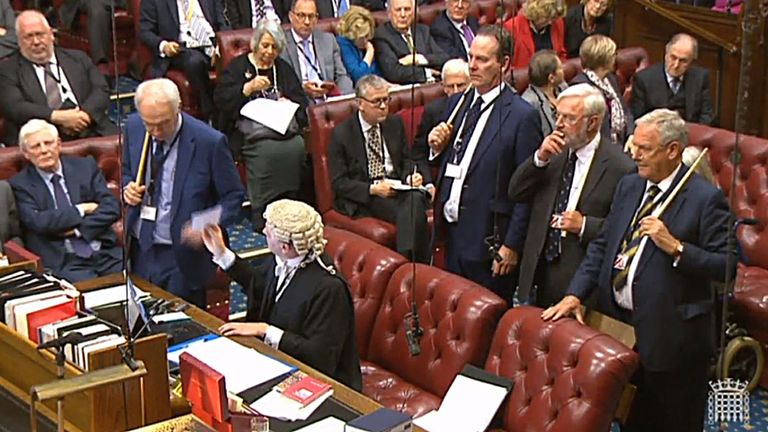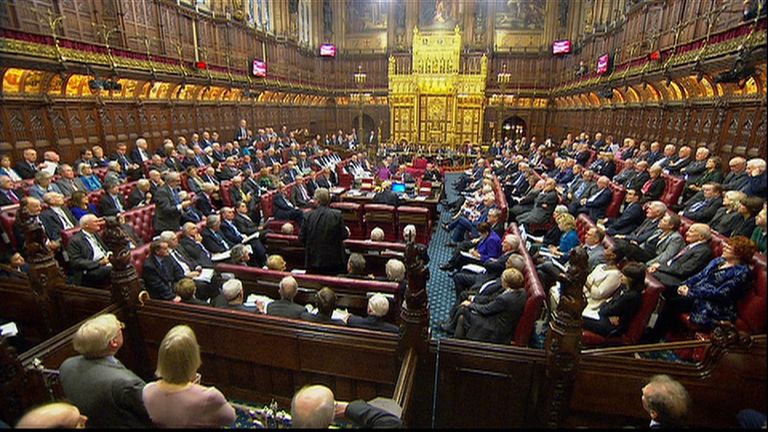Not even Sir Andrew Lloyd Webber can save the Tories
Lloyd Webber's rumoured to have only voted 30 times in his first 18 years in the Lords - but his backing didn't make a difference.
Thursday 2 March 2017 19:53, UK
You know it's a big vote and the Government's in trouble when Andrew Lloyd Webber turns up in the House of Lords.
And there he was, the composer of Cats, Evita and Phantom of the Opera, in a chamber packed with peers and passion.
So packed, that the red benches were full and dozens of peers had to stand at both ends of the chamber. Some were even in the upper galleries.
And so much passion that even the Archbishop of York, who was supporting the Government, got into some ungodly clashes with Labour peers.
In week when the Lords was described in a TV documentary as "the best day-care centre for the elderly in London" some of the old-timers rolled back the years and showed plenty of vigour.
For instance, there was uproar as Norman Tebbit, who in 1990 claimed UK Asians failed "the cricket test", complained: "Today we seem to be thinking of nothing but the rights of foreigners."
And moments later the 85-year-old provoked laughter when he said: "Of course we don't have the power to look after our citizens overseas, not in these days when we don't have many gunboats."
The Tories didn't have a monopoly on showbiz peers. Labour's Melvyn Bragg was there and spoke in the debate, as did the former EastEnders actor, Labour peer Michael Cashman.
There was no sign of Theresa May on the steps in front of the throne this time. But Amber Rudd, the Home Secretary who for many peers was the pantomime villain, was there for part of the debate.
The result, when it came after more than three hours of debate, showed a bigger majority than predicted for the amendment to the Article 50 Bill aiming to protect EU citizens living in the UK.
A Tory peer told me during the voting that the Government looked like losing by about 50. In fact the Opposition's majority was a hefty 102, in a 358-256 vote in favour of the amendment.
The division list showed two bishops, despite Dr John Sentamu speaking up for the Government, and seven Conservative peers voted for the amendment.
The Tory rebels included the former Pensions Minister Roz Altmann, ex-MP Patrick Cormack, former Cabinet Minister Douglas Hogg, who has now taken his late father's Viscount Hailsham title, and the former Sunday Telegraph editor Patience Wheatcroft.
Viscount Hailsham made a blistering speech in favour of the amendment right at the start of the debate, just after it had been moved by Diane Hayter, who speaks for Labour on Brexit.
Urging peers to be take up the moral high ground, Hailsham said: "The moral high ground is often the best ground to fight a campaign."
Significantly, 78 of the 177 Crossbench peers voted for the amendment, helping swell the majority to over 100. Labour's turnout was 165 and the LibDems' 93.
After the vote, Angela Smith, Labour's leader in the Lords, told Sky News she thought the scale of the defeat might persuade the Government to decide not to start a "ping pong" process between the Commons and the Lords.
No chance. David Davis' Brexit department swiftly issued a statement insisting the Government would make sure it gets its Bill through to enact the referendum result and get on with the negotiations.
In his Sky News interview, the former Government Leader in the Lords Tom Strathclyde, who's seen more ping pong than a Chinese sports addict, said he could see no room for compromise.
So even if a Lords amendment demanding a Parliamentary vote on the Brexit deal, backed by former Deputy Prime Minister Michael Heseltine, is defeated next week, the Bill will now go back to the Commons.
The defeat won't have come as a surprise to the Government, however. Two weeks ago, during a visit to Stockholm, Mr Davis admitted it was likely.
"We'll have some passing backwards and forward," he said. "We call it ping-pong, you can imagine why, backwards and forwards of the Bill, but I expect that to be resolved in good time before the end of March."
There's no reason why that shouldn't happen, even though it's Budget day next Wednesday, followed by four days of debate, probably. The Government can overturn Lords amendments in a single day, with a programme motion.
Despite the bravado or Labour and LibDem peers after their victory, it's unlikely that the Lords will pass their amendments a second time. So we will have ping, certainly, but probably no pong.
The Lords don't have anything as vulgar as programme motions, guillotining debate and laying down a strict timetable. Which makes the Lords proceedings all the more unpredictable.
In fact, during the feisty and at times ill-tempered debate on EU citizens, there were moments of farce and chaos as well as bitter disputes between Government and Opposition peers.
The farce and chaos came as a result of the Lords Speaker, or whoever is in the chair during a Bill's committee stage, having no power to decide who speaks next or tell peers to sit down and shut up, like the Commons Speaker.
As a result, the Government's chief whip, Lord Taylor, frequently had to intervene to rule on who was to speak next as several peers began speaking at once when the previous speaker sat down.
But perhaps the most powerful argument in favour of the amendment came right at the end, from Baroness Hayter, winding up the debate seconds before peers voted.
She looked around the chamber for the veteran Lord Dubs, whose amendment on child refugees was accepted by the Government last year but then ditched earlier this month.
And when she spotted Dubs behind, she looked the Brexit minister Lord Bridges in the eye and told peers: "As Lord Dubs would testify, assurances are not enough."
The 102 majority suggests victory for the amendment was already in the bag and it wasn't the Dubs reminder that swung the vote. But it may have boosted the scale of the Government's defeat.
As for Andrew Lloyd Webber, who currently has four musicals opening on Broadway in New York for the first time, I'm sure he felt his day in the Lords supporting the Government in a losing cause was worth it.
Well, perhaps not. Last year he complained he was "fed up" of being "lobby fodder", amid claims he only voted 30 times in his first 18 years in the Lords after being enobled by John Major.
Lloyd Webber's Phantom of the Opera includes the song All I Ask Of You, which is what the Government chief whip presumably said to him when he asked him to come and vote.
But it also has another called The Point Of No Return, which is how the musical maestro may feel about returning to vote for the Government on the Article 50 Bill when it's back in the Lords next Tuesday.





